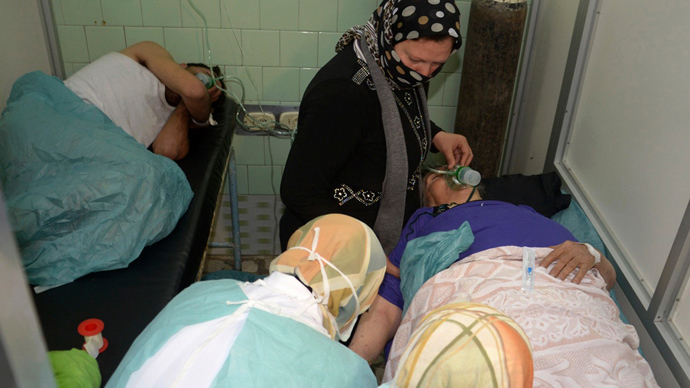In a number of interviews to European news outlets, the former hostages - Belgian teacher Pierre Piccinin and Italian journalist Domenico Quiric - said they overheard an English-language Skype conversation between their captors and other men which suggested it was rebel forces, not the government, that used chemical weapons on Syria’s civilian population in an August 21 attack near Damascus.
“It is a moral duty to say this. The government of Bashar al-Assad did not use sarin gas or other types of gas in the outskirts of Damascus,” Piccinin said during an interview with Belgium's RTL radio station.
Piccinin stressed that while being held captive, he and fellow prisoner Quirico were secluded from the outside world and had no idea that chemical weapons were deployed. But the conversation which both men overheard suggested that the use of the weapons was a strategic move by the opposition, aimed at getting the West to intervene.
"In this conversation, they said that the gas attack on two neighborhoods of Damascus was launched by the rebels as a provocation to lead the West to intervene militarily,”Quirico told Italy’s La Stampa. "We were unaware of everything that was going on during our detention in Syria, and therefore also with the gas attack in Damascus."
While stating that the rebels most likely exaggerated the accident’s death toll, the Italian journalist stressed that he could not vouch whether “the conversation was based on real facts." However, he said that one of the three people in the alleged conversation identified himself as a Free Syrian Army general, La Stampa reported.
Based on what both men have learned, Peccinin told RTL that it would be “insane and suicidal for the West to support these people.”
“It pains me to say it because I've been a fierce supporter of the Free Syrian Army in its rightful fight for democracy since 2012," Piccinin added.

“I am extremely surprised that the United States could think about intervening, knowing very well how the Syrian revolution has become international jihadism – in other words Al-Qaeda," Quirico said, as quoted by Italy’s Quotidiano Nazionale.
The 62-year-old La Stampa journalist believes that radical Islamic groups operating in Syria to topple Assad “want to create a caliphate and extend it to the entire Middle East and North Africa.”
In a number of news appearances, both Quirico and Piccinin shared stories of how they were subjected to two mock executions, beaten, and starved during their five-month captivity.
"These have been very tough months. We were beaten on a daily basis, we suffered two mock executions," Quirico told reporters upon his arrival in Rome, AFP reported.

"There was sometimes real violence...humiliation, bullying, mock executions...Domenico faced two mock executions, with a revolver," Piccinin told RTL.
Both men were kidnapped in Syria last April by a group of armed men in pickup trucks who were believed to be from Free Syrian Army.
According to Piccinin, the captors soon transferred them over to the Abu Ammar brigade, a rebel group "more bandit than Islamist."
"We were moved around a lot...it was not always the same group that held us, there were very violent groups, very anti-West and some anti-Christian," Piccinin said.
Both men tried to escape twice but their attempts were unsuccessful, prompting the rebel group to punish them for their actions.
The Italian government announced on Sunday that both men had been freed after Rome intensified negotiations with the rebels for the release of the prisoners ahead of an anticipated US strike on Syria.
Another 13 journalists are still believed to be missing in Syria, according to Reporters Without Borders.
Source: http://rt.com/news/chemical-weapons-rebels-captives-632/


